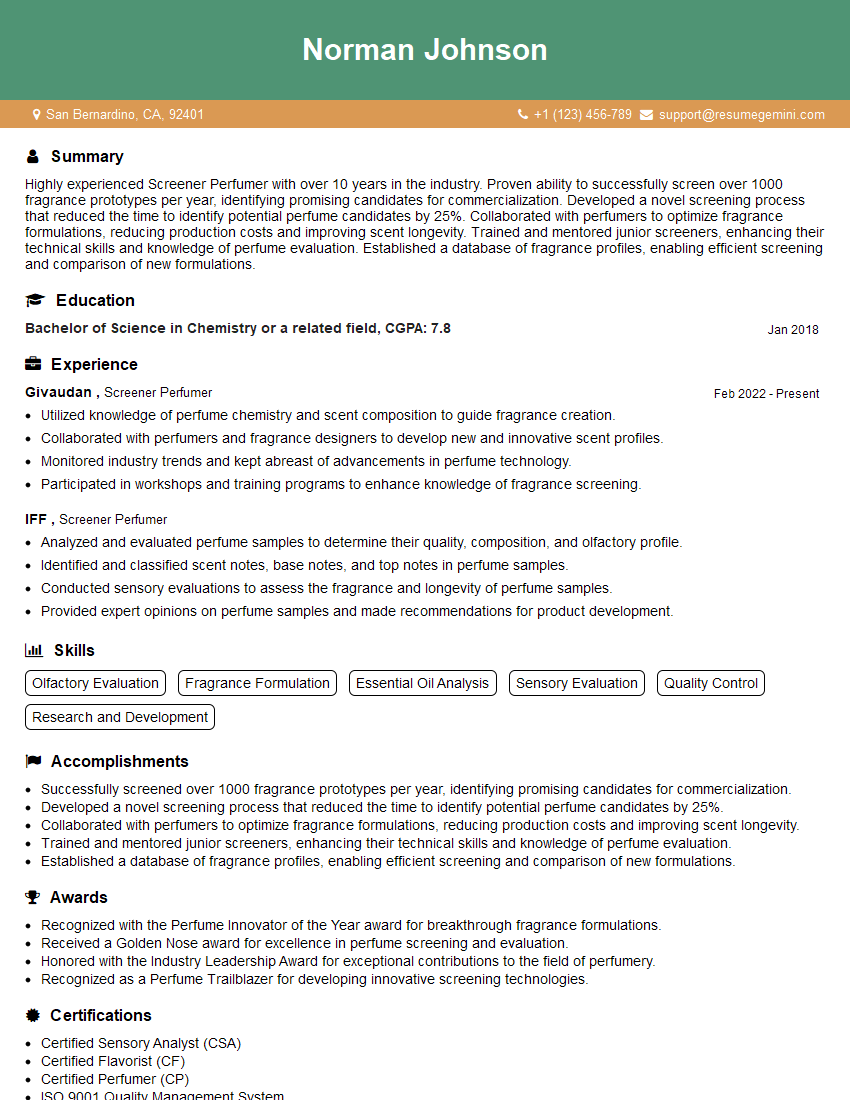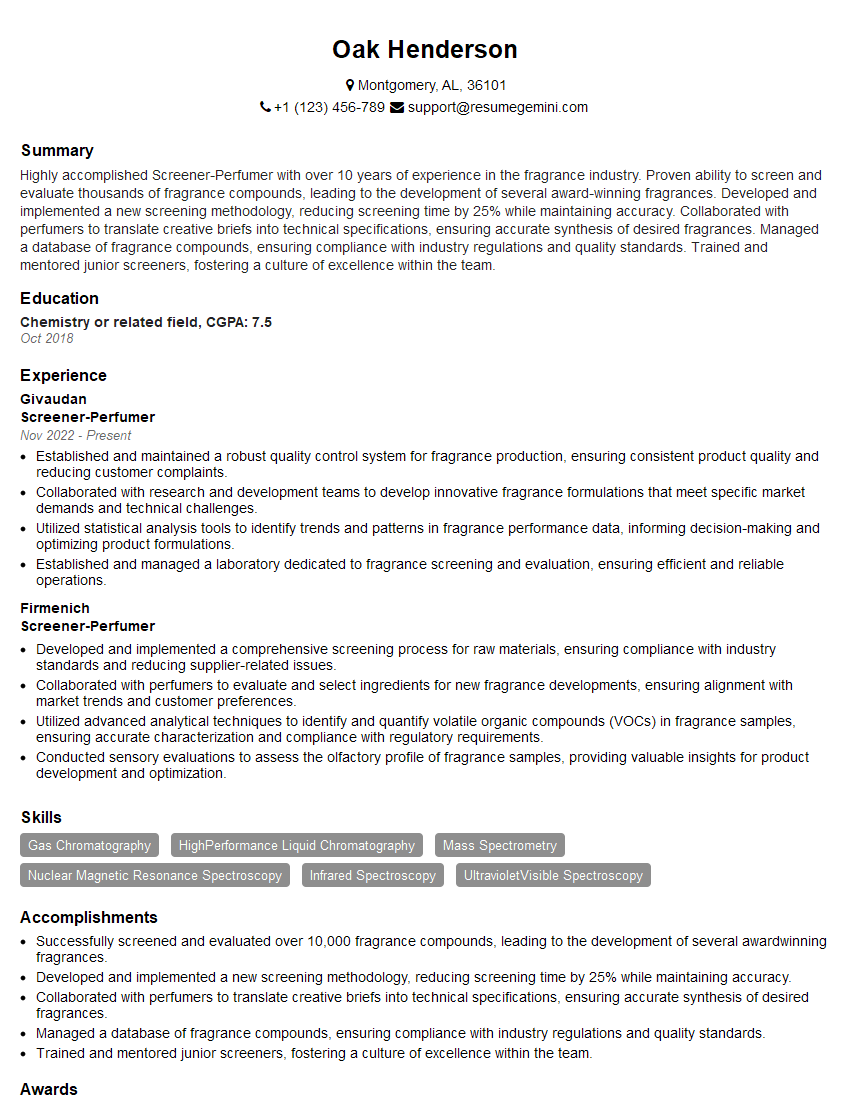Are you gearing up for a career shift or aiming to ace your next interview? Look no further! We’ve curated a comprehensive guide to help you crack the interview for the coveted Screener Perfumer position. From understanding the key responsibilities to mastering the most commonly asked questions, this blog has you covered. So, buckle up and let’s embark on this journey together.
Acing the interview is crucial, but landing one requires a compelling resume that gets you noticed. Crafting a professional document that highlights your skills and experience is the first step toward interview success. ResumeGemini can help you build a standout resume that gets you called in for that dream job.
Essential Interview Questions For Screener Perfumer
1. What are the key responsibilities of a Screener Perfumer?
- Evaluate and select fragrance samples for further development
- Identify and categorize fragrances based on their olfactory characteristics
- Provide feedback and suggestions to perfumers on potential fragrance formulations
- Stay abreast of industry trends and innovations in perfumery
- Collaborate with other members of the fragrance development team
2. Describe the process you use to screen fragrance samples
Olfactory Evaluation
- Apply fragrance samples to blotters or skin
- Evaluate the fragrance’s top notes, heart notes, and base notes
- Identify key olfactory characteristics such as floral, woody, citrus, etc.
Categorization
- Categorize fragrances based on their scent families and accords
- Utilize fragrance wheels and other classification systems
- Determine the target audience and market for each fragrance
Feedback and Recommendations
- Provide feedback to perfumers on the strengths and weaknesses of their formulations
- Suggest modifications or improvements to enhance the fragrance’s performance or appeal
- Identify potential commercial viability and market potential
3. What are some of the challenges you face as a Screener Perfumer?
- Subjectivity of fragrance evaluation
- Staying up-to-date with industry trends
- Balancing creativity and commercial viability
- Working with a diverse range of perfumers and briefs
- Maintaining a high level of objectivity and consistency
4. What are the qualities that make a successful Screener Perfumer?
- Exceptional olfactory sensitivity and discrimination
- Strong understanding of perfume chemistry and ingredients
- Ability to identify and categorize fragrances accurately
- Creative and analytical thinking with a keen eye for detail
- Excellent communication and interpersonal skills
5. How do you stay up-to-date with the latest developments in perfumery?
- Attend industry events and conferences
- Read industry publications and blogs
- Experiment with new fragrance materials and techniques
- Collaborate with perfumers and other fragrance professionals
- Explore different cultures and regions for inspiration
6. What is the most rewarding aspect of your job?
- Being exposed to a wide range of fragrances
- Playing a role in the creation of new and innovative scents
- Seeing your work come to life in the form of successful products
- Collaborating with talented perfumers and fragrance professionals
- Contributing to the beauty and enjoyment of others
7. What is the most challenging aspect of your job?
- The subjectivity of fragrance evaluation
- The need to balance creativity with commercial viability
- The pressure to meet deadlines and deliver results
- Working with a diverse range of perfumers and briefs
- Maintaining a high level of objectivity and consistency
8. What are the most important skills for a Screener Perfumer?
- Exceptional olfactory sensitivity and discrimination
- Strong understanding of perfume chemistry and ingredients
- Ability to identify and categorize fragrances accurately
- Creative and analytical thinking with a keen eye for detail
- Excellent communication and interpersonal skills
9. What is the career path for a Screener Perfumer?
With experience and expertise, Screener Perfumers can advance to roles such as:
- Perfumer
- Fragrance Evaluator
- Fragrance Development Manager
- Sensory Scientist
- Consultant in the fragrance industry
10. What is your favorite fragrance and why?
This question is subjective and will vary depending on the candidate’s personal preferences. However, a good answer will demonstrate the candidate’s knowledge of fragrances, their ability to describe scents in detail, and their passion for perfumery.
Interviewers often ask about specific skills and experiences. With ResumeGemini‘s customizable templates, you can tailor your resume to showcase the skills most relevant to the position, making a powerful first impression. Also check out Resume Template specially tailored for Screener Perfumer.
Career Expert Tips:
- Ace those interviews! Prepare effectively by reviewing the Top 50 Most Common Interview Questions on ResumeGemini.
- Navigate your job search with confidence! Explore a wide range of Career Tips on ResumeGemini. Learn about common challenges and recommendations to overcome them.
- Craft the perfect resume! Master the Art of Resume Writing with ResumeGemini’s guide. Showcase your unique qualifications and achievements effectively.
- Great Savings With New Year Deals and Discounts! In 2025, boost your job search and build your dream resume with ResumeGemini’s ATS optimized templates.
Researching the company and tailoring your answers is essential. Once you have a clear understanding of the Screener Perfumer‘s requirements, you can use ResumeGemini to adjust your resume to perfectly match the job description.
Key Job Responsibilities
A Screener Perfumer is responsible for identifying potential new fragrances and evaluating their mass appeal. Their key responsibilities include:
1. Screening and evaluating new fragrance submissions
Assess the potential of new fragrance submissions based on their scent, originality, and market appeal.
- Determine the target audience and market fit for each fragrance.
- Conduct thorough sensory evaluations to identify desirable characteristics and potential flaws.
2. Providing feedback to fragrance creators
Communicate qualitative and quantitative assessments to fragrance creators, providing constructive criticism.
- Offer suggestions for improvement, focusing on enhancing marketability and appeal.
- Collaborate with creators to refine fragrances and optimize their potential.
3. Identifying trends and market opportunities
Stay abreast of industry trends and consumer preferences to identify emerging opportunities.
- Monitor market data, consumer feedback, and competitive products.
- Identify gaps in the market and suggest new fragrance directions.
4. Maintaining a fragrance database and library
Maintain a comprehensive database of screened fragrances for reference and future development.
- Document fragrance profiles, sensory evaluations, and market assessments.
- Keep up-to-date with industry standards and best practices.
Interview Tips
To ace an interview for a Screener Perfumer position, it is crucial to not only demonstrate your technical expertise but also your passion for fragrances and your understanding of the industry.
1. Research the company and the industry
Gain insights into the company’s fragrance portfolio, market positioning, and key competitors.
- Read industry publications and attend trade shows to stay informed about the latest trends.
- Prepare questions that show your interest in the company and its products.
2. Showcase your sensory evaluation skills
Emphasize your ability to describe fragrances accurately and analyze their key characteristics.
- Bring samples of scents you have analyzed to demonstrate your expertise.
- Explain your evaluation process and how you identify potential fragrances for further development.
3. Highlight your understanding of fragrance marketing
Discuss your knowledge of target audience identification, market segmentation, and the influence of consumer preferences.
- Share examples of successful fragrance launches and explain the strategies behind their success.
- Demonstrate your ability to think strategically and identify opportunities in the fragrance market.
4. Express your passion for fragrances
Convey your genuine enthusiasm for the world of perfumery and your desire to contribute to the creation of exceptional fragrances.
- Share your personal fragrance preferences and describe the scents that inspire you.
- Explain how your passion for fragrances drives you to excel in this field.
Next Step:
Armed with this knowledge, you’re now well-equipped to tackle the Screener Perfumer interview with confidence. Remember, a well-crafted resume is your first impression. Take the time to tailor your resume to highlight your relevant skills and experiences. And don’t forget to practice your answers to common interview questions. With a little preparation, you’ll be on your way to landing your dream job. So what are you waiting for? Start building your resume and start applying! Build an amazing resume with ResumeGemini.

